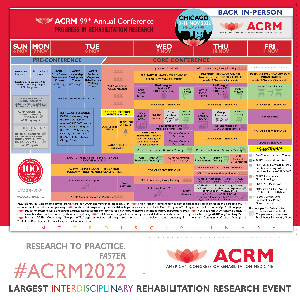Back
Lifestyle Medicine
Cognitive Behavioral Therapy for Insomnia in Women Experiencing Menopausal and Post-Menopausal Insomnia: A Scoping Review
Friday, November 11, 2022
10:25 AM – 10:30 AM
Location: Station 9

Erin D. Stoner, MSOT
Occupational Therapy Student
Concordia University of Wisconsin
Franklin, Wisconsin, United States
Susan Wilbanks, PhD, ATC
Assistant Professor
Concordia University Wisconsin
Mequon, Wisconsin, United States
Non-presenting Author(s)
Presenting Author(s)
Research Objectives: To describe the effectiveness of CBT-I to decrease insomnia symptoms in menopausal-aged women.
Design: Electronic databases were searched using terms encompassing insomnia, CBT-I, and menopausal age.
Setting: A variety of settings are addressed within the articles included in this scoping review. They range from in-person, to online, and over the phone.
Participants: Seven articles met inclusion criteria of utilizing a CBT-I strategy in women of menopausal or post-menopausal age, and measuring at least one sleep-related outcome.
Interventions: Each article utilized a variety of CBT-I strategies and ranged in duration of administration. Common CBT-I strategies include: sleep restriction, stimulus control, sleep hygiene education, relaxation techniques (i.e. meditation, imagery training, and progressive muscle relaxation), cognitive reappraisal, cognitive control/worry time, and paradoxical intention.
Main Outcome Measures: Outcome measures extracted from the articles included in the study included insomnia symptoms, sleep quality, quality of life, and mental health.
Results: Studies primarily utilized sleep restriction, stimulus control, and sleep hygiene education techniques. Across studies, insomnia symptoms and sleep quality improved with moderate to large effect sizes and achieving clinically significant changes in most studies. Quality of life and mental health were improved in studies measuring those outcomes.
Conclusions: CBT-I is a practical and effective intervention for menopausal-aged women experiencing insomnia, providing clinically meaningful reductions in insomnia symptoms, improvements in sleep quality, quality of life, and mental health. Further research would benefit from more detailed analyses of the different techniques, duration, frequency, and potential alternative delivery methods.
Author(s) Disclosures: The authors declare no conflict of interest.
Design: Electronic databases were searched using terms encompassing insomnia, CBT-I, and menopausal age.
Setting: A variety of settings are addressed within the articles included in this scoping review. They range from in-person, to online, and over the phone.
Participants: Seven articles met inclusion criteria of utilizing a CBT-I strategy in women of menopausal or post-menopausal age, and measuring at least one sleep-related outcome.
Interventions: Each article utilized a variety of CBT-I strategies and ranged in duration of administration. Common CBT-I strategies include: sleep restriction, stimulus control, sleep hygiene education, relaxation techniques (i.e. meditation, imagery training, and progressive muscle relaxation), cognitive reappraisal, cognitive control/worry time, and paradoxical intention.
Main Outcome Measures: Outcome measures extracted from the articles included in the study included insomnia symptoms, sleep quality, quality of life, and mental health.
Results: Studies primarily utilized sleep restriction, stimulus control, and sleep hygiene education techniques. Across studies, insomnia symptoms and sleep quality improved with moderate to large effect sizes and achieving clinically significant changes in most studies. Quality of life and mental health were improved in studies measuring those outcomes.
Conclusions: CBT-I is a practical and effective intervention for menopausal-aged women experiencing insomnia, providing clinically meaningful reductions in insomnia symptoms, improvements in sleep quality, quality of life, and mental health. Further research would benefit from more detailed analyses of the different techniques, duration, frequency, and potential alternative delivery methods.
Author(s) Disclosures: The authors declare no conflict of interest.
Learning Objectives:
- Upon completion, participant will be able to name at least three techniques used in cognitive behavioral therapy for insomnia
- Upon completion, participant will be able to describe the effects of CBT-I on insomnia symptoms in menopausal-aged women
- Upon completion, participant will be able to discuss how delivery method may influence the success of CBT-I

.jpg)
